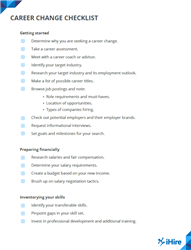- Job Seeker Resources
- |
- Last Updated: July 13, 2021

How to Change Careers: A Preparation Checklist
This career change checklist will help you prepare for successfully breaking into a new industry or exploring a different career path.
Making a career change is not an easy decision, especially if you’re jumping into an entirely new industry. But with the right planning and preparation, successfully changing career paths is doable.
If you’re unsure how to change careers or don’t know where to start, this career change checklist will help guide you through the process.
Getting Started
- Determine your “why”: Before you make any drastic decisions, ask yourself why you want to change careers. Is it due to necessity (for example, you’re in a declining industry)? Are you bored, frustrated, or burned out in your current role? Knowing your “why” will help you set realistic goals – or you may find that your reason for seeking a change can be addressed without overhauling your career and starting from square one.
- Take a career assessment: Even if you have a new profession in mind, taking a career assessment (or two) can help ensure you’re pursuing a job in an industry that’s right for you. There are plenty of free career and personality tests available online to help you narrow your options. But if you are truly stuck, working with a certified career coach or advisor can offer valuable guidance.
- Research target industries: Learn as much as you can about your desired new industry. What’s the employment outlook? Will it be difficult to find a job in your location? What are common career paths for someone breaking into that field? The BLS Occupational Outlook Handbook is a great place to start digging into this information.
- Identify possible career titles: While researching your target industry, make a list of career titles that interest you. Browse online job postings to get an idea of the required qualifications and job duties for those roles, as well as which companies are hiring and whether there are opportunities near you.
- Note potential employers: Jot down employers you come across during your research that pique your interest. Check out their websites, career pages, social media sites, and online reviews and testimonials from employees to understand their brand, mission, culture, and any other attributes that make for a good place to work.
- Request informational interviews: Reach out to potential employers to schedule informational interviews. The purpose of an informational interview is to learn more about a particular career, workplace, or industry. This is a way to get a taste of your new career and build your network.
- Set goals: Create a timeline detailing your job search plan and set specific, tangible goals to hold yourself accountable. For example, you might aim to have your first interview scheduled by a certain date. Or, you may plan to apply to a minimum of three jobs a day.

Preparing Financially
- Explore salaries: Many times, a career change comes with a pay cut. In addition to the BLS Occupational Outlook Handbook, there are numerous salary comparison tools and calculators to help you gauge the pay scale for your new career path. (To access iHire’s salary comparison tools, log into your account and select “More” at the top of the page. Click “Salary Research” on the right-hand menu that appears to get started.)
- Get your finances in order: Once you know the type of pay you would earn, determine whether you can live comfortably with that salary. Map out your monthly expenses and create a budget with your new income in mind.
- Brush up on salary negotiation tactics: Although you may have to take a pay cut at the start (and it may be worth it in the long run), be prepared to negotiate a fair salary. Know your needs, what you’re willing to compromise, and which skills and attributes you can leverage to receive a fair offer.
Inventorying Your Skills
- Identify your transferable skills: Make a list of skills you’ve acquired thus far in your current career that you can apply to your new career. These can be soft skills (e.g., leadership, critical thinking) or hard skills (e.g., writing, coding).
- Pinpoint gaps: What skills do you lack that are “must-haves” for your new career? Do you need any specific certifications? How long will it take you to attain the required skills and/or certifications? Factor that into your plan.
- Invest in professional development: Whether you need to get a certain certification or simply need to bring yourself up to speed on the ins and outs of your new industry, now is the time to further your education. Massive Open Online Courses (MOOCs), webinars, and online boot camps are no- or low-cost avenues for expanding your knowledge.

Updating Your Materials
- Revamp your resume: Making a career change requires a resume that plays up your transferable skills. Update your resume accordingly, calling out relevant experiences and qualifications. Customize your resume for each position you apply for to ensure you make it past employers’ applicant tracking systems (ATS).
- Draft a cover letter: Create a cover letter that you can customize to accompany each job application. Here, it’s important to address your career change and explain what transferable skills and pertinent experience you bring to the table.
- Update online profiles: Spruce up any online profiles (professional and personal) before you begin applying to jobs. Adjust privacy settings as needed and ensure your professional profiles highlight relevant experience for your potential new position.
- Create an elevator pitch: Take time to create a 30-second elevator pitch about yourself. Like your cover letter, your pitch should mention why you’re making a career change. Practice this pitch before your first job interview.
- Round up references: Reach out to potential references who can vouch for your transferable skills, willingness to learn, and any other qualities pertinent to your new career path. Keep your list of references handy for when an employer requests them (never include them on your resume).
Find your next great opportunity. Register with one of iHire's 56 industry-focused communities.
Beginning Your Search
- Join job boards and talent communities: Utilize a variety of job search platforms, including industry-specific sites, to discover job openings in your new field. Similarly, sign up for job alerts so you’ll always see fresh opportunities as they arise. And don’t forget to make your resume searchable so employers can find you.
- Tap into your network: Do you know anyone who might be able to point you toward an opportunity to get your foot in the door. Connect with these individuals (family, friends, former colleagues, professors, etc.) and experience the power of networking.
- Track your applications: Keep tabs on where you’ve applied and when, as well as whether you interviewed and received an offer. Follow up with employers if you don’t hear back in a couple of weeks – this will help you stand out from the crowd.
- Be patient: As with any job search, finding the right opportunity takes time. Meanwhile, explore volunteer work, gig or part-time jobs, and professional development opportunities relevant to your career change (and don’t forget to include these initiatives on your resume).
Changing careers is a time-consuming, complex process, but this checklist will enable a smoother start to your new journey. When you’re ready to begin your search, iHire’s 57 industry-focused talent communities will help you get started.

Originally Published: September 28, 2020
Sign In or Register to access all articles and insider tips for help in your job search.
Search for iHire Jobs
RELATED JOBS
RELATED RESOURCES
Find the Right Job Faster
- Get personalized job matches sent to your inbox every day
- Connect directly with employers before your competition
- Advance your career with expert advice on interviewing, salary negotiation, and more
We value your privacy





